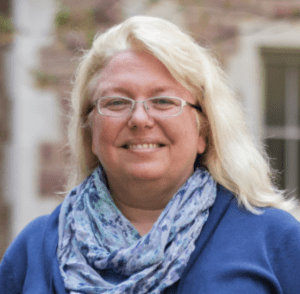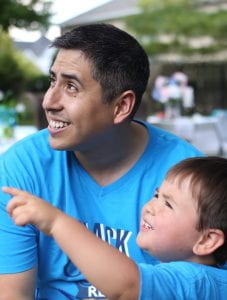“If we can get in there earlier and tilt things on a healthier trajectory, people will end up having positive developmental experiences that…will maybe lead to better outcomes.”
 An interview with Deanna Barch
An interview with Deanna Barch
Chair and Professor of Psychological & Brain Sciences; Professor of Radiology; Gregory B Professor of Psychiatry; Washington University in St. Louis
By: Michelle Johnson (2/7/20)
Were you always interested in scientific research growing up?
I’m a first gen college student, and when I went to college, I was convinced that I wanted to be a high school counselor. I didn’t really know about research, I didn’t know about science as a career. I took a class in abnormal psychology, I did well in the class, and [the professor] said, “Would you be interested in doing a research rotation in my lab?” and I was like, “Well, I don’t know what that is but I’ll try it.” It opened up a whole new world for me. I ended up staying, doing my honors thesis in her lab, and I took a gap year after college and continued to work in her lab. During this time I also worked as a case manager for the chronically mentally ill in Chicago for a year. This was a really rewarding experience but made me realize that I would be able to have a much bigger impact by going back to graduate school and doing research on causes and treatment of mental illness than I would be able to working with individual clients.
Has your work as a case manager impact the research questions you’re interested in?
When I was working as a case manager, there was a client that really stood out in my head. It was a young man who had had his first episode of schizophrenia pretty young in life, and he was slightly younger than me. Prior to having his first episode, he was in college, he was anticipating a whole trajectory of what things were going to be like. He was not one of those people who recovered well from his first episode, and it was pretty clear that he was going to go on to have a chronic course. It struck me how different that was from where I was—I was here at this point in my life where I had just finished college, I felt like I could do whatever I wanted.
That got me interested in psychosis and trying to understand early predictors and development. It just seems like if we could help people get back on a healthy developmental trajectory early, we prevent exposure to all these sorts of negative things that compound having a mental illness. If we can get in there earlier and tilt things on a healthier trajectory, people will end up having positive developmental experiences that, even if they continue to have mental illness, will maybe lead to better outcomes.
Have you been able to apply your research in practice?
We have been able to do more practice-oriented work looking at treatments designed to intervene with early onset depression. They seem to be effective, at least in the shorter term, meaning a one-year follow-up. Now we have longitudinal studies looking at the impact if this has over the longer term, [if] this early intervention between ages three and seven means that these kids have a better course during middle-child and adolescence than they might had they not had an early intervention.
 What does an intervention look like?
What does an intervention look like?
In kids with depression, we see a lot of lack of joy and positive affect as well as the presence of negative affect. The treatment is designed to harness the parent as an emotion regulator for the child and to work with the dyad to help [the parent] help the child learn how to better regulate both their negative and positive emotions. It really is embedded in a family. At that age, you never just treat the kid in isolation. You really need to treat the context in which the kid is embedded and to help the parents develop skills that they can use to help the kid over time.
What’s the best piece of advice you’d received?
Don’t be afraid to take risks. If you play it too safe in terms of the hypotheses you’re willing to go after, the things you’re willing to try, you might miss important new information. I don’t mean that in an unsafe way, but you have to really try high risk, high reward studies and be willing to not stick within the confines of previous results and try to do something really different. That and “be generous” are two really good pieces of advice that had been given to me in which I try to pass on to my students and postdocs.
To learn more about Dr. Barch and her work, click here.
Click here to go back to the “Interviews with Scientists” page.
